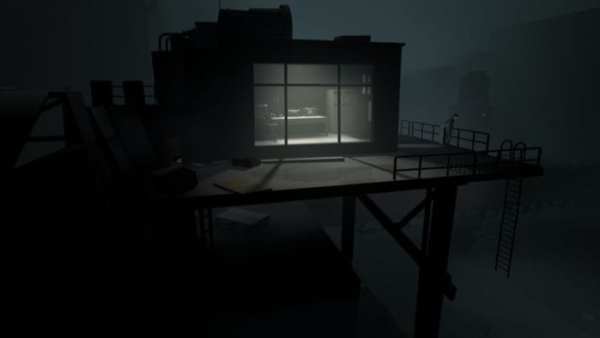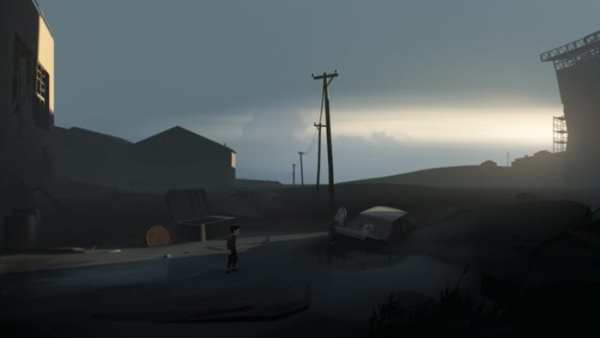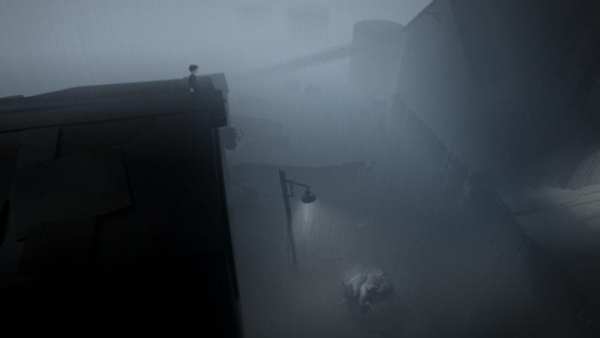Inside on Xbox One
Immediately, you’re dropped into a dark forest, assuming the small frame of a red-shirted boy huddled against the cold. As you make your way over fallen branches and obstacles, flashlights peer through the darkness and the sounds of dogs snarling and barking echo through the night. If the men behind the flashlights catch a glimpse of you, they’ll chase you down and suffocate you. There’s no telling why these people are after you, all you need to know is that they’ll kill you or capture you on sight. This is how Inside starts, right off the bat, just a title screen and then you’re off.
You’re immediately dropped into the action as the boy, trekking through the wilderness. As you run from the strange masked men and hounds, the game quickly puts you in situations where you’re forced to learn its three different controls rather than explaining them. You move with the left analog stick, the boy trips over a branch and gets caught, so the next time you try hitting buttons and find out the A button jumps. Subsequently, you find out the X button grabs items in the world, allowing you to push and pull them. Inside literally has just these three controls, along with some minimal control on the right analog stick during certain sequences. This simplicity doesn’t hold the game back at all however, as Inside shines because of it.
At its core, Inside is about exploration, picking your way through ruined buildings and cities all the while finding out bits and pieces of the game’s dark story. The two mechanics of jumping and grabbing are integrated to all of the game’s puzzles. Whether that’s grabbing boxes and lining them up just right to jump to a rope, or setting up a hydraulic jet boosting box to land on a platform in order to help you continue ascending.

The puzzles of Inside are simplistic, but they challenge players to not overthink things, instead asking you to think about how the items featured in a puzzle would actually work together. Later in the game the puzzles get progressively more mind-bending, making you think outside of the box. This also applies to the look and feel of Inside. Immediately when you start in the forest you can tell something just isn’t right in the world, and this feeling grows stronger and stronger throughout the game.
The forest gives way to a mist ridden slaughterhouse with dead pigs and possibly other things lying in piles all around. Before long, the boy stumbles upon a room with a strange device and lifeless human forms lying in the background. Once you find a way to get up to the device and strap it to the boy’s’ head, the human forms spring to life, and you’re suddenly controlling them through the helmet. This is the first time one of Inside’s central themes emerges, control. This theme continually comes to the surface, provoking thought on the difference between the sentient humans and the lifeless ones, as well as some of the being you see near the end.

Things only get progressively more dystopic the further your progress. Strange deformed human-like creatures begin popping up, and other humans who seem to be normal are practically herding them. Some of the enemies you face are absolutely terrifying chasing you through certain areas, building panic within you as they quickly close the gap, and you rush to find a way to stop them. Inside also has one of the best underwater segments I’ve ever seen in a game.
There are quite a few shocking moments built into the story, and the game definitely takes an unexpected turn in its last stretch, albeit not a bad one. Much of what happens throughout the story of Inside is left up to player’s interpretations, even the melancholic ending is fairly ambiguous. This may be somewhat of a disappointment for anyone looking for a story that has more meat to it, and explains a little more of its central mystery.
On the visual front, Inside helps pound home its aesthetic and feel. The color palette is a bit wider than in Playdead’s last outing, Limbo, although there’s still a lot of grays and blacks, with the rest of the colors feeling a bit muted. Darkness and light play into the game helping you figure out the correct path forward, and the red shirt of the boy sticks out in sharp contrast to the rest of the game. The muted color scheme give the game a gorgeous painterly look, and the animations flow so smoothly it almost makes everything feel surreal.

Inside’s audio design is intentionally minimalist, with very little music and mostly just sound effects. Every once in awhile, slow tonal music will kick in to accentuate when you’ve found the solution to a puzzle, or a particularly important moment. By and large Inside is unnervingly quiet, though this works for the game and helps set the tone even more. Although, every once in a while I found myself wondering if my sound was even on.
Inside isn’t an incredibly long experience, clocking in at around 4-5 hours, but the game keeps you glued to the screen the entire time. I played through the game in one sitting, barely taking any breaks, just because I wanted to see the truth behind everything and what was next. The environments and puzzles are varied enough to keep you invested for all four hours. After completing the game, you also unlock the ability to instantly jump to any segment and replay it.
As phenomenal of an experience as Limbo was, Playdead somehow managed to top it with Inside. It’s a hauntingly beautiful game, especially for how violent and dark it turns by the end. The mechanics, while simple, really cause you to stop and think how all the elements of a puzzle should work together. Although it’s a rather short experience, Inside will undoubtedly keep you thinking hours after you’ve seen the credits roll. You’ll definitely be pondering the implications of what happened, and it’ll make you eager to replay it in case you might have missed anything.
SCORE: 4.5/5 – GREAT
PROS
| CONS
|

